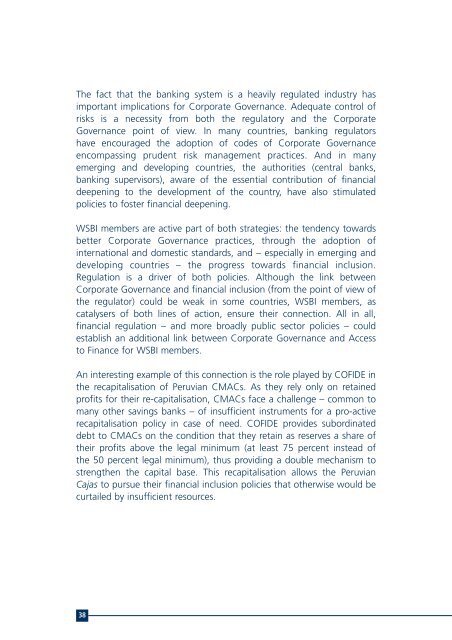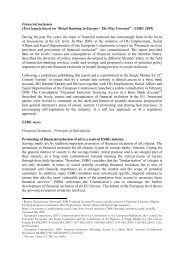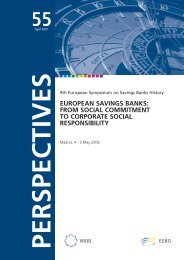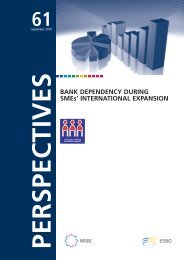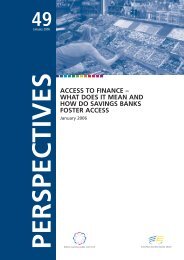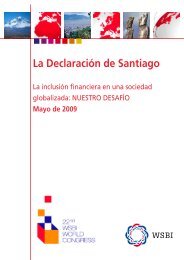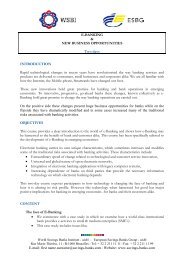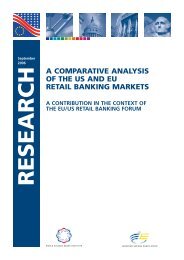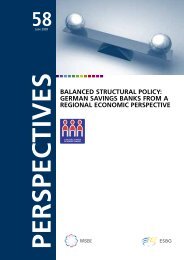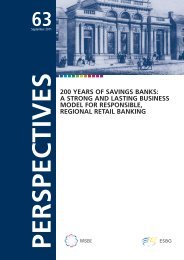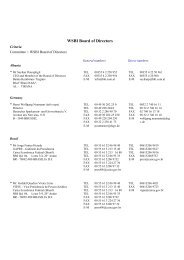Corporate Governance and Access to Finance - ESBG
Corporate Governance and Access to Finance - ESBG
Corporate Governance and Access to Finance - ESBG
You also want an ePaper? Increase the reach of your titles
YUMPU automatically turns print PDFs into web optimized ePapers that Google loves.
The fact that the banking system is a heavily regulated industry hasimportant implications for <strong>Corporate</strong> <strong>Governance</strong>. Adequate control ofrisks is a necessity from both the regula<strong>to</strong>ry <strong>and</strong> the <strong>Corporate</strong><strong>Governance</strong> point of view. In many countries, banking regula<strong>to</strong>rshave encouraged the adoption of codes of <strong>Corporate</strong> <strong>Governance</strong>encompassing prudent risk management practices. And in manyemerging <strong>and</strong> developing countries, the authorities (central banks,banking supervisors), aware of the essential contribution of financialdeepening <strong>to</strong> the development of the country, have also stimulatedpolicies <strong>to</strong> foster financial deepening.WSBI members are active part of both strategies: the tendency <strong>to</strong>wardsbetter <strong>Corporate</strong> <strong>Governance</strong> practices, through the adoption ofinternational <strong>and</strong> domestic st<strong>and</strong>ards, <strong>and</strong> – especially in emerging <strong>and</strong>developing countries – the progress <strong>to</strong>wards financial inclusion.Regulation is a driver of both policies. Although the link between<strong>Corporate</strong> <strong>Governance</strong> <strong>and</strong> financial inclusion (from the point of view ofthe regula<strong>to</strong>r) could be weak in some countries, WSBI members, ascatalysers of both lines of action, ensure their connection. All in all,financial regulation – <strong>and</strong> more broadly public sec<strong>to</strong>r policies – couldestablish an additional link between <strong>Corporate</strong> <strong>Governance</strong> <strong>and</strong> <strong>Access</strong><strong>to</strong> <strong>Finance</strong> for WSBI members.An interesting example of this connection is the role played by COFIDE inthe recapitalisation of Peruvian CMACs. As they rely only on retainedprofits for their re-capitalisation, CMACs face a challenge – common <strong>to</strong>many other savings banks – of insufficient instruments for a pro-activerecapitalisation policy in case of need. COFIDE provides subordinateddebt <strong>to</strong> CMACs on the condition that they retain as reserves a share oftheir profits above the legal minimum (at least 75 percent instead ofthe 50 percent legal minimum), thus providing a double mechanism <strong>to</strong>strengthen the capital base. This recapitalisation allows the PeruvianCajas <strong>to</strong> pursue their financial inclusion policies that otherwise would becurtailed by insufficient resources.38


